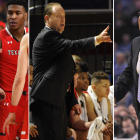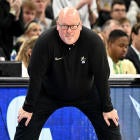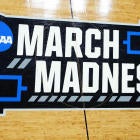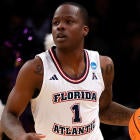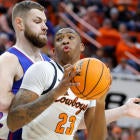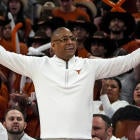Time has come for CBS Sports' annual review of the biggest coaching hires in college basketball -- four years after they were made.
Let's check the files to see which athletic directors knew what they were doing during the carousel spins of 2016. You'll recall that was the year Villanova won the national title at the buzzer, courtesy of Kris Jenkins. It was also the final season for Tubby Smith at Texas Tech, Josh Pastner at Memphis, Bo Ryan at Wisconsin and Eddie Jordan at Rutgers, among others. (You can see the entire list here.)
As I've explained in each of the previous three Aprils (we first came up with this idea in 2017, and you can read the four-years-post evaluations hires from 2013, 2014 and 2015 in those links right there), a balanced way of grading out a school's hiring is to give a coach a full "recruiting cycle," which is a four-year span. We've got a mixed bag to sort through here.
When handing out grades, everything from overall record to NCAA Tournament showings to NCAA issues (where applicable) and of course recruiting prowess is considered.
Grading the most notable hires from 2016
All hires listed below come from college basketball's Major Seven conferences: ACC, American Athletic Conference, Big 12, Big East, Big Ten, Pac-12 and SEC.
| The hire: Chris Beard Grade: A Without debate the best hire of 2016. All Beard's done in his four seasons with the Red Raiders is take the program to its first Elite Eight in school history (2018) then follow that up with its first trip to a Final Four and national title game the next year. Texas Tech took Virginia to overtime in one of the better national championship games of the past 30 years. In 2018-19, Beard's team also played a major role in ending one of the greatest team streaks in sports history: Kansas' run of Big 12 regular-season championships was halted at 14 when TTU and Kansas State tied atop the league standings. TTU's 84.1 defensive rating at KenPom for 2018-19 is the stingiest defense in the history of Pomeroy's ratings. Beard was the CBS Sports and AP National Coach of the Year in 2019. Beard is 94-44 (.681) in four seasons with the Red Raiders and, once Jahmi'us Ramsey is drafted later this year -- likely in the first round -- will have cultivated a first-round pick out of Texas Tech in three consecutive seasons after the school had only one draft pick in the previous 20 years. | |
| The hire: Greg Gard Grade: B-plus Gard was technically brought on full-time in March 2016, four months after he took over for Bo Ryan, who abruptly retired the prior December -- so Gard gets logged as a 2016 hire, since that's when it was official. Had the 2019-20 season not ended due to COVID-19, Gard would have put the Badgers into the NCAA Tournament for the fourth time in five years. Gard has found some success in March; in 2016 and 2017 Wisconsin made the Sweet 16. UW's averaged 20 wins under Gard, and four of his near-five seasons have seen Wisconsin finish at least fourth in the Big Ten. This past season, Gard won his first Big Ten regular-season title, sharing a three-way tie with Michigan State and Maryland. Some losses on the recruiting trail, but the program hasn't fallen off much since Ryan left. | |
| The hire: Steve Pikiell Grade: B It's a near-certainty that Rutgers would have made its first NCAA Tournament in 29 years had the 2020 NCAAs gone off. The Scarlet Knights went 20-11 (first 20-win season in 16 years) and finished 28th at KenPom. Pikiell's record in four seasons is still below .500 (64-65) but this is Rutgers, one of the five worst power-conference jobs in college basketball. He's got the program going in the right direction for the first time in eons. Most recent evidence: landing top-50 recruit Cliff Omoruyi, who will team up with a Scarlet Knights squad next season that looks top 25-good heading into 2020-21. Rutgers finished tied for fifth in the Big Ten this past season, its best mark in that league since joining in 2014 and its best finish in league play since RU was fifth in the 2001-02 Big East. All five previous Rutgers coaches failed to last more than five seasons, but barring a promotion to a bigger job, that won't happen with Pikiell. | |
| The hire: Jamie Dixon Grade: B An 85-57 record and one NCAA Tournament appearance at a school with little college basketball pedigree. Dixon is coming off his worst season (16-16) with the Horned Frogs. His first season featured an NIT championship, in 2017, then TCU made the 2018 NCAA tourney as a 6 seed (but lost in the first round to Syracuse). Next season could prove crucial in terms of where TCU can navigate in the Big 12 over the next half-decade. TCU is not expected to be a top-five team in the 10-school Big 12, but Dixon's overachieved with many a team in his career and his squad for 2020-21 could be one of the true dark horses. If he can get TCU to the NCAAs once every three seasons, it's a whiz of a job there. That objective is difficult but still possible. | |
| The hire: Johnny Dawkins Grade: B UCF's only made one NCAA Tournament in Dawkins' four seasons, but its 2019 run included a second-round epic against Duke that was in fact one of the 101 greatest tournament games of the modern era. Dawkins has guided the Knights to an 83-48 record and bypassed other job opportunities along the way. UCF is coming off its worst season under Dawkins (16-14) but the program is on seemingly steady ground in the next couple of years. UCF has just five Big Dance appearances to its name, so things have gone about as well as could be hoped to this point in Orlando. | |
| The hire: Brad Underwood Grade: B The oddity hire of the group. Underwood only lasted one season because Oklahoma State athletic director Mike Holder was asleep at the wheel and allowed Illinois to come in and poach Underwood at a higher price after OSU went 20-13 and made the NCAAs as a No. 10 seed (20-13) in 2017. It was a good hire, but a bad job in keeping him. All in all, a "B" sounds right. Underwood's assistant, Mike Boynton Jr., was given the job after Underwood left. Next season Boynton will bring in the most talented freshman in the country, Cade Cunningham. Underwood, meantime, will get evaluated again a year from now in this space, after he completes his fourth season with Illinois. | |
| The hire: Jerod Haase Grade: B-minus Haase is coming into his own here. Stanford is yet to make an NCAA Tournament under Haase -- and given it lost to Cal in the Pac-12 Tournament the day before the NCAA Tournament was canceled, no guarantee it would have made it this year -- but next season should have no excuses. (Barring injuries, of course.) Haase just got a commitment from Ziaire Williams, a five-star 2020 wing who is a top-five player in the class. He's the best get for Stanford's program in almost two decades. Haase should have a top-20 team next season. Through four years he's garnered a 69-61 record, with 2017-18's two-and-through NIT appearance being the high point. | |
| The hire: Josh Pastner Grade: C-plus Georgia Tech was dealt a 2020 postseason ban for recruiting benefits paid to the likes of Wendell Carter Jr. and others years ago, but the NCAA lauded Pastner in spite of the punishment for how he handled the infractions process and what he provided to investigators. Then the 2020 postseason gets canceled and Georgia Tech's punishment is absolved all the same. Fortunate dodge for Ga. Tech. The Yellow Jackets have not been relevant during Pastner's term, however. Just a 65-67 record, with this past season's 11-9 mark in the ACC (good for fifth) being tops in his time there. Georgia Tech is a tougher job than some realize, but Pastner's offense has not ranked better than 171st during his time in Atlanta -- that's not nearly good enough. Next season will be pivotal. | |
| The hire: Bryce Drew Grade: C Drew was not given the benefit of the doubt by his new AD, Malcom Turner (who refused to even take meetings with him after getting the job) and he was fired after his third season. That was 2018-19 when Drew lost eventual top-five NBA pick Darius Garland five games in to a knee injury. Had Garland never been injured, is Drew still coaching Vanderbilt now? Certainly possible. As is, he spent last season as a TV analyst for ESPN and was hired in March by Grand Canyon. Drew went 40-59 at Vandy and made the NCAAs as a No. 9 seed in his first season. He had success on the recruiting trail. He was succeeded by Jerry Stackhouse, who went 11-21 in his first season. | |
| The hire: Tubby Smith Grade: D-plus This hire was as worth it as much as it wasn't because of what came after (and how much remains to be seen with that ongoing experiment). Smith only made it two seasons, finishing 40-26 and not making the NIT in either campaign. He was infamously poor at making connections with the talent-rich regions in and around Memphis, which ultimately played into his downfall and helped Penny Hardaway land the job. The Tigers were not a disaster, but they simply became irrelevant and were the focal point of frustration on a near-every-week basis for the fan base. Smith was the wrong fit at the wrong time, but it might wind up being for the best if Hardaway can find a way to get the talent he's bringing to Memphis to actually lead to NCAA Tournament appearances. | |
| The hire: Mike Dunleavy Grade: D-minus Dunleavy was a bad hire. A coach not built for the college game who took a job that required a lot more than he was able to commit to. The Green Wave went 24-69 under Dunleavy and were winless in league play in 2018-19, his third and final season with the program. There's not much more to add here. It's a tough job in a fun city and you have to get the right mix of guys to make a dent in the American Athletic Conference. Ron Hunter was an upgrade, but even he will need two more years to get things cooking with some gas. Tulane's average KenPom ranking in Dunleavy's tenure was 232. | |
| The hire: Kevin Stallings Grade: F What a horrendous hire, among the three or four worst by a power-conference school in the past two decades. It's not just 24-41 overall record nor the fact that Pitt was 0-18 in the ACC in Stallings' second and final season of his coaching career. No, Pitt was also subject to NCAA violations under Stallings' watch and in fact the man was dealt a three-year show-cause penalty in February 2020 for wrongdoings that were largely tied to non-coaches performing duties only allowed by coaches. But Stallings going to Pitt to begin with befuddled plenty in college basketball. His time at Vanderbilt did not end well and he wasn't viewed as a particularly strong candidate for the Panthers job. But he took it, torpedoed it, and that was that. Now Jeff Capel has the whistle and Pitt awaits a surge back into the top third off its conference. | |
























